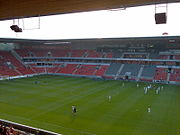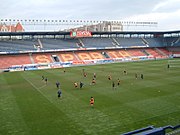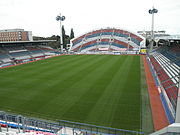The 2015 UEFA European Under-21 Championship was the 20th edition of the UEFA European Under-21 Championship, a biennial international football competition for men's under-21 national teams organised by UEFA. The final tournament was hosted for the first time in the Czech Republic from 15 to 30 June 2015, after their bid was selected by the UEFA Executive Committee on 20 March 2012 in Istanbul.[1]
| Mistrovství Evropy ve fotbale hráčů do 21 let 2015 | |
|---|---|
 | |
| Tournament details | |
| Host country | |
| Dates | 17–30 June |
| Teams | 8 (from 1 confederation) |
| Venue(s) | 4 (in 3 host cities) |
| Final positions | |
| Champions | |
| Runners-up | |
| Tournament statistics | |
| Matches played | 15 |
| Goals scored | 37 (2.47 per match) |
| Attendance | 162,994 (10,866 per match) |
| Top scorer(s) | |
| Best player(s) | |
Players born on or after 1 January 1992 were eligible to participate in the competition.[2] Fifty-two teams participated in a qualification tournament, taking place between March 2013 and October 2014, to determine the seven teams that would join the final tournament hosts. Holders Spain were not able to defend their title after being eliminated in the qualification play-offs by Serbia.
In the final, played at the Eden Arena in Prague, Sweden defeated Portugal 4–3 in a penalty shootout, after a goalless draw at the end of extra-time. In doing so, the Swedish team won their first title in this competition, having previously lost the 1992 final, and secured their first-ever title in UEFA youth competitions on the men's side.
By reaching the semi-finals, Denmark, Germany, Portugal and Sweden also qualified for the 2016 Summer Olympics men's football tournament in Brazil.[3]
Qualification
Qualification for the final tournament of the 2015 UEFA European Under-21 Championship consisted of two rounds: a group stage and a play-off round. The group stage draw took place on 31 January 2013 in Nyon, Switzerland, and distributed 52 national teams into ten groups of five or six teams. Each group was contested in a double round-robin system, where teams played each other twice, at home and away. The ten group winners and the four best second-placed teams advanced to the play-off round, where they were paired by draw into seven two-legged ties. The play-off winners joined the Czech Republic in the final tournament.[4]
Qualified teams
The following teams qualified for the 2015 UEFA European Under-21 Championship final tournament:
| Country | Qualified as | Previous appearances in tournament1 only U-21 era (since 1978) |
|---|---|---|
 Czech Republic Czech Republic | Hosts | 11 (19785, 19805, 19885, 19905, 19925, 19945, 1996, 2000, 2002, 2007, 2011) |
 Denmark Denmark | Playoff winner (against Iceland) | 5 (1978, 1986, 1992, 2006, 2011) |
 England England | Playoff winner (against Croatia) | 12 (1978, 1980, 1982, 1984, 1986, 1988, 2000, 2002, 2007, 2009, 2011, 2013) |
 Germany Germany | Playoff winner (against Ukraine) | 11 (19822, 19842, 19882, 19902, 1992, 1996, 1998, 2004, 2006, 2009, 2013) |
 Italy Italy | Playoff winner (against Slovakia) | 17 (1978, 1980, 1982, 1984, 1986, 1988, 1990, 1992, 1994, 1996, 2000, 2002, 2004, 2006, 2007, 2009, 2013) |
 Portugal Portugal | Playoff winner (against Netherlands) | 6 (1994, 1996, 2002, 2004, 2006, 2007) |
 Serbia Serbia | Playoff winner (against Spain) | 8 (19783, 19803, 19843, 19903, 20044, 20064, 2007, 2009) |
 Sweden Sweden | Playoff winner (against France) | 6 (1986, 1990, 1992, 1998, 2004, 2009) |
- 1 Bold indicates champion for that year. Italic indicates host for that year.
- 2 As West Germany
- 3 As Yugoslavia
- 5 As Czechoslovakia
Venues
The competition was played at four venues in three host cities: Eden Arena and Generali Arena (in Prague), Andrův stadion (in Olomouc), and Stadion Miroslava Valenty (in Uherské Hradiště).[5][6]
Match officials
Six refereeing teams took charge of matches at the final tournament:[7]
| Country | Referee | Assistant referees | Additional assistant referees |
|---|---|---|---|
 France France | Clément Turpin | Frédéric Cano Nicolas Danos | Fredy Fautrel Nicolas Rainville |
 Greece Greece | Anastasios Sidiropoulos | Damianos Efthymiadis Polychronis Kostaras | Michael Koukoulakis Stavros Tritsonis |
 Netherlands Netherlands | Danny Makkelie | Mario Diks Hessel Steegstra | Kevin Blom Jochem Kamphuis |
 Poland Poland | Szymon Marciniak | Paweł Sokolnicki Tomasz Listkiewicz | Paweł Raczkowski Tomasz Musiał |
 Russia Russia | Sergei Karasev | Anton Averyanov Tikhon Kalugin | Sergey Lapochkin Sergei Ivanov |
 Spain Spain | Javier Estrada Fernández | Miguel Martínez Munuera Teodoro Sobrino Magán | Alejandro Hernández Hernández Jesús Gil Manzano |
| Country | Fourth officials |
|---|---|
 Czech Republic Czech Republic | Jan Paták Ondrej Pelikan |
Seeding
The draw for the final tournament took place at 18:00 CET on 6 November 2014, at the Clarion Congress Hotel in Prague. England, the highest-ranked team according to the competition coefficient rankings, and the host team, Czech Republic, were seeded and automatically assigned to separate groups. The second and third-ranked teams in the coefficient rankings, Italy and Germany, were also seeded and drawn into separate groups, while the four unseeded teams were drawn into the remaining positions of the two groups.[2][8]
| Top seeds | Second seeds | Unseeded |
|---|---|---|
|
Squads
Each national team had to submit a squad of 23 players, three of whom had to be goalkeepers. If a player was injured or ill severely enough to prevent his participation in the tournament before his team's first match, he could be replaced by another player.[2]
Format of competitions

The eight finalists were drawn into two groups of four teams. As hosts, Czech Republic were seeded in group A, while England, the best-ranked team in the UEFA coefficient ranking, were seeded in group B. In each group, teams played matches against each other in a round-robin system, and the top two teams advanced to the semi-finals.[9][10]
The provisional schedule was released by UEFA on 10 November 2014,[11] and confirmed on 2 December 2014.[12][13] All times are in Central European Summer Time (UTC+02:00).
After the conclusion of the group stage, the following four teams from UEFA qualified for the Olympic football tournament.
Tie-breaking
If two or more teams were equal on points on completion of the group matches, the following tie-breaking criteria were applied:[2]
- Higher number of points obtained in the matches played between the teams in question;
- Superior goal difference resulting from the matches played between the teams in question;
- Higher number of goals scored in the matches played between the teams in question;
If, after having applied criteria 1 to 3, teams still had an equal ranking, criteria 1 to 3 were reapplied exclusively to the matches between the teams in question to determine their final rankings. If this procedure did not lead to a decision, criteria 4 to 6 were applied.
- Superior goal difference in all group matches;
- Higher number of goals scored in all group matches;
- Position in the UEFA under-21 coefficient ranking used for the final draw.
If only two teams were tied (according to criteria 1–5) after having met in the last match of the group stage, their ranking would have been determined by a penalty shoot-out.
Group A
| Pos | Team | Pld | W | D | L | GF | GA | GD | Pts | Group stage result |
|---|---|---|---|---|---|---|---|---|---|---|
| 1 |  Denmark Denmark | 3 | 2 | 0 | 1 | 4 | 4 | 0 | 6 | Advance to knockout stage and 2016 Summer Olympics |
| 2 |  Germany Germany | 3 | 1 | 2 | 0 | 5 | 2 | +3 | 5 | |
| 3 |  Czech Republic (H) Czech Republic (H) | 3 | 1 | 1 | 1 | 6 | 3 | +3 | 4 | |
| 4 |  Serbia Serbia | 3 | 0 | 1 | 2 | 1 | 7 | −6 | 1 |
Czech Republic  | 1–2 |  Denmark Denmark |
|---|---|---|
Kadeřábek  35' 35' | Report | Vestergaard  56' 56'Sisto  84' 84' |
Serbia  | 0–4 |  Czech Republic Czech Republic |
|---|---|---|
| Report | Kliment  7', 21', 56' 7', 21', 56'Frýdek  59' 59' |
Czech Republic  | 1–1 |  Germany Germany |
|---|---|---|
Krejčí  66' 66' | Report | Schulz  55' 55' |
Group B
| Pos | Team | Pld | W | D | L | GF | GA | GD | Pts | Group stage result |
|---|---|---|---|---|---|---|---|---|---|---|
| 1 |  Portugal Portugal | 3 | 1 | 2 | 0 | 2 | 1 | +1 | 5 | Advance to knockout stage and 2016 Summer Olympics |
| 2 |  Sweden Sweden | 3 | 1 | 1 | 1 | 3 | 3 | 0 | 4 | |
| 3 |  Italy Italy | 3 | 1 | 1 | 1 | 4 | 3 | +1 | 4 | |
| 4 |  England England | 3 | 1 | 0 | 2 | 2 | 4 | −2 | 3 |
England  | 0–1 |  Portugal Portugal |
|---|---|---|
| Report | João Mário  57' 57' |
Knockout stage
In the knockout stage, extra time and penalty shoot-out were used to decide the winner if necessary.[2]
Bracket
| Semi-finals | Final | |||||
| 27 June – Prague | ||||||
 Denmark Denmark | 1 | |||||
| 30 June – Prague | ||||||
 Sweden Sweden | 4 | |||||
 Sweden (p) Sweden (p) | 0 (4) | |||||
| 27 June – Olomouc | ||||||
 Portugal Portugal | 0 (3) | |||||
 Portugal Portugal | 5 | |||||
 Germany Germany | 0 | |||||
Semi-finals
Final
Goalscorers
- 3 goals
- 2 goals
- 1 goal
 Martin Frýdek
Martin Frýdek Pavel Kadeřábek
Pavel Kadeřábek Ladislav Krejčí
Ladislav Krejčí Uffe Bech
Uffe Bech Rasmus Falk
Rasmus Falk Viktor Fischer
Viktor Fischer Pione Sisto
Pione Sisto Jannik Vestergaard
Jannik Vestergaard Jesse Lingard
Jesse Lingard Nathan Redmond
Nathan Redmond Emre Can
Emre Can Matthias Ginter
Matthias Ginter Nico Schulz
Nico Schulz Andrea Belotti
Andrea Belotti Domenico Berardi
Domenico Berardi Ivan Cavaleiro
Ivan Cavaleiro Ricardo Horta
Ricardo Horta Gonçalo Paciência
Gonçalo Paciência Ricardo
Ricardo Bernardo Silva
Bernardo Silva Filip Đuričić
Filip Đuričić Oscar Hiljemark
Oscar Hiljemark Isaac Kiese Thelin
Isaac Kiese Thelin Robin Quaison
Robin Quaison
Source: UEFA.com[17]
Awards
Golden Boot
The Golden Boot is given to the player who scored the most goals during the tournament.[18]
| Golden Boot | Silver Boot | Bronze Boot |
|---|---|---|
Note: Assists and then minutes played (with the player boasting the better goals to minutes on the pitch ratio taking precedence) are used to separate players with the same goal tallies.
Player of the tournament
After the tournament the U21 EURO Player of the Tournament is selected by the UEFA Technical Observers.[19]
| Player of the tournament |
|---|
Team of the tournament
After the tournament the Under-21 Team of the Tournament is selected by the UEFA Technical Observers.[20]
| Position | Player |
|---|---|
| Goalkeeper |  José Sá José Sá |
| Defenders |  Victor Lindelöf Victor Lindelöf |
 Filip Helander Filip Helander | |
 Jannik Vestergaard Jannik Vestergaard | |
 Raphaël Guerreiro Raphaël Guerreiro | |
| Midfielders |  William Carvalho William Carvalho |
 Oscar Lewicki Oscar Lewicki | |
 Nathan Redmond Nathan Redmond | |
 Bernardo Silva Bernardo Silva | |
 Ivan Cavaleiro Ivan Cavaleiro | |
| Forward |  Kevin Volland Kevin Volland |
Medal table
| Pos | Team | Pld | W | D | L | GF | GA | GD | Pts | Final result |
|---|---|---|---|---|---|---|---|---|---|---|
 Sweden Sweden | 5 | 2 | 2 | 1 | 7 | 4 | +3 | 8 | Gold Medal | |
 Portugal Portugal | 5 | 2 | 3 | 0 | 7 | 1 | +6 | 9 | Silver Medal | |
 Denmark Denmark | 4 | 2 | 0 | 2 | 5 | 8 | −3 | 6 | Eliminated in semi-finals | |
 Germany Germany | 4 | 1 | 2 | 1 | 5 | 7 | −2 | 5 | ||
| 5 |  Czech Republic (H) Czech Republic (H) | 3 | 1 | 1 | 1 | 6 | 3 | +3 | 4 | Eliminated in group stage |
| 6 |  Italy Italy | 3 | 1 | 1 | 1 | 4 | 3 | +1 | 4 | |
| 7 |  England England | 3 | 1 | 0 | 2 | 2 | 4 | −2 | 3 | |
| 8 |  Serbia Serbia | 3 | 0 | 1 | 2 | 1 | 7 | −6 | 1 |
(H) Hosts
Qualification for the 2016 Summer Olympics
Same as previous Under-21 Championships that were held one year prior to the Olympics, UEFA used the tournament to determine which men's under-23 national teams from Europe qualify for the Olympic football tournament. The four teams which advanced to the semi-finals qualified for the 2016 Summer Olympics in Brazil.[21] However, England are ineligible for the Olympics and they are not an Olympic nation. Had England reached the semi-finals, the last Olympic spot would go to the winner of an Olympic play-off match between the two group third-placed teams, which was scheduled to be played on 28 June 2015, 18:00, at Stadion Miroslava Valenty, Uherské Hradiště.[11][22] However, when England failed to advance out of the group stage, this was cancelled.[n 1]
| Team | Qualified on | Previous appearances in tournament1 |
|---|---|---|
 Denmark Denmark | 23 June 2015 | 8 (1908, 1912, 1920, 1948, 1952, 1960, 1972, 1992) |
 Germany Germany | 23 June 2015 | 8 (1912, 1928, 1936, 1952, 19562, 19722, 19842, 19882) |
 Portugal Portugal | 24 June 2015 | 3 (1928, 1996, 2004) |
 Sweden Sweden | 24 June 2015 | 9 (1908, 1912, 1920, 1924, 1936, 1948, 1952, 1988, 1992) |
- 1 Bold indicates champion for that year. Italic indicates host for that year. Statistics include all Olympic format (current Olympic under-23 format started in 1992).
- 2 The team represented the United Team of Germany in 1956, and the Federal Republic of Germany (i.e., West Germany) in 1972, 1984 and 1988.
Broadcasting
Countries who are not covered by a local broadcaster had the matches broadcast on YouTube.[25]
| Territory | Rights holder | Ref |
|---|---|---|
 Australia Australia | beIN Sports | [25] |
 Brazil Brazil | SporTV | [25][26] |
 Canada Canada | TSN, RDS | [25][26] |
| Caribbean | ESPN | [25][26] |
 China China | CCTV | [25] |
 Indonesia Indonesia | MNC Media | [26] |
 Japan Japan | WOWOW | [25] |
| Latin America | ESPN | [25] |
 Malaysia Malaysia | Astro | [26] |
| Sub-Saharan Africa | Ma Chaîne Sport | [25] |
 Thailand Thailand | PPTV | [25] |
 United States United States | ESPN | [25] |
Ambassador
Former Czech Republic midfielder Pavel Nedvěd was the ambassador for the tournament.[34]
Notes
References
External links








